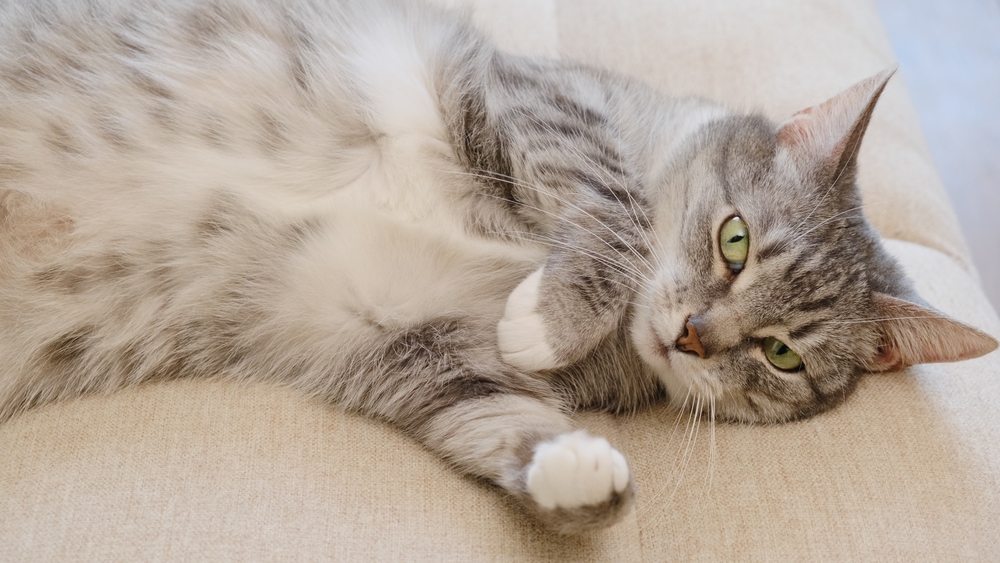Your Senior Cat: What to Expect at 16+ Years
Published on May 03, 2012

Congratulations! You’ve come a long way with your cat. At 16 she’s as much a part of your world as any human family member. There will be a lot of changes as your cat moves deeper into her twilight years. Continue your good work toward ensuring this time is as enjoyable and enriching as possible for both of you.
All featured products are chosen at the discretion of the Vetstreet editorial team and do not reflect a direct endorsement by the author. However, Vetstreet may make a small affiliate commission if you click through and make a purchase.
Physical and Mental Development
By age 16 your cat’s physical and mental development is very much like that of an 80-year-old person. She has definitely slowed down physically (relative to her prime adult years) and may have developed a number of health problems. She has probably started to slow down cognitively as well. She may not respond as quickly to stimulation and is likely becoming more forgetful and confused. At this stage, even if she is in good health, it is not a bad idea to talk to your veterinarian about what you want the last years of your cat’s life to be like, including the issues that are most important to you and what’s best for your cat.
You will have to give your veterinarian information about what your cat is like at home before determining what care is appropriate. For example, perhaps your cat has become less interested in her favorite activities, or even though she’s napping more, she might seem restless.
Her eating and drinking habits might also be changing, and she may be more of a loner, even looking for places to hide from the family. That is important information to share with your veterinarian to help her determine whether there are medical problems requiring treatment or if a “calming-care” approach is most appropriate to keep your cat as comfortable and happy as possible.
Behavior Changes
By now your cat is noticeably less active than she used to be. She might avoid some activities she used to enjoy, perhaps because she has lost interest, or because they cause her discomfort. As cats age, sometimes they become more aggressive, overreacting to loud or strange sounds or new people. On the other hand, your cat may react less to such stimuli because she simply does not hear or see as well. Additionally, she may become less fastidious about grooming herself.
Try not to hover. She is still a cat, and as all cat lovers know, cats prefer to come to you on their terms. Keep her comfortable and relaxed by providing a quiet space with familiar toys and bedding, and let her be herself.
Health and Nutrition
You will want to schedule medical checkups at least twice a year now, so that your veterinarian can better detect and monitor any health problems.
You should tell your veterinarian about any behavioral changes, including shifts in appetite and water consumption, incontinence, aggressive behavior, mental confusion, and tendencies to hide from familiar people. You can also purchase an at-home test to monitor your cat’s digestion.
Take note of whether your cat seems to pant more, is short of breath, is more picky about food, or seems more reluctant than usual to move around. These all can be signs that she is in pain. There may be ways for your veterinarian to keep her more comfortable. If you are unsure whether your cat is suffering, keep a journal of your observations of her behavior and remember to share it with your veterinarian.
Do not dismiss your cat’s health changes as “untreatable.” There are new treatment options available all the time, and early diagnosis and treatment or management can help your cat enjoy her later years in comfort.
Hospice care is a growing area of veterinary medicine. It may or may not be an appropriate option for your cat and your family. If you choose hospice, it is critical to enlist the support of your veterinarian, who can help keep your cat from suffering with expert pain management, along with strategies to maintain oxygen levels and hydration.
Make sure you have a support system available to help care for your cat, as needed, when you can’t be at home. Also, it is important to establish a relationship with a veterinary group that is available 24 hours a day for emergency euthanasia, should your cat’s suffering become unbearable.
The Importance of Cat Health Insurance
Your cat health insurance policy can help to offset unexpected treatment costs. These costs may include veterinary visits, prescription medications, or procedures such as imaging or surgery.
Find a personalized plan for your cat by using the insurance finder below:
Training Tips
At 16 or older, your cat is a bit beyond training. You may need to adjust certain household expectations if she’s becoming forgetful about rules she used to know. Also, reassess her living conditions from her point of view. If she has arthritis, for example, and the litterbox is upstairs, she might start having accidents simply because it’s too hard to climb the stairs.
You may need to have multiple litterboxes or create multiple food and water stations to increase her access to such necessities. Continue to look for ways to provide mental stimulation to keep her mind as sharp as possible, and make sure her toys are within easy reach.
It is up to you to make your cat’s golden years as comfortable as possible. You and your veterinarian should work together to continually assess her health and well-being, making changes in her care as necessary. She has given you years of companionship and entertainment; now it is your turn to be there for her. Don’t forget that you both still need and will enjoy quality time spent together.



